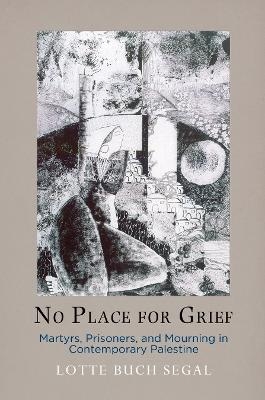
No Place for Grief
Martyrs, Prisoners, and Mourning in Contemporary Palestine
Seiten
2025
University of Pennsylvania Press (Verlag)
978-1-5128-2793-4 (ISBN)
University of Pennsylvania Press (Verlag)
978-1-5128-2793-4 (ISBN)
- Noch nicht erschienen (ca. Mai 2025)
- Portofrei ab CHF 40
- Auch auf Rechnung
- Artikel merken
Advances an understanding of loss, mourning, and grief in contemporary Palestine
Westerners 'know' Palestine through images of war and people in immediate distress. Yet this focus has as its consequence that other, less spectacular stories of daily distress are rarely told. Those seldom noticed are the women behind the men who engage in armed resistance against the military occupation: wives of the Palestinian prisoners in Israeli detention and the widows of the martyrs. In Palestine, being related to a detainee serving a sentence for participation in the resistance activities against Israel is a source of pride. Consequently, the wives of detainees are expected to sustain these relationships through steadfast endurance, no matter the effects upon the marriage or family. Often people, media, and academic studies address the dramatic violence and direct affliction of the Palestinians. Lotte Buch Segal takes a different approach, and offers a glimpse of the lives, and the contradictory emotions, of the families of both detainees and martyrs through an in-depth ethnographic investigation.
No Place for Grief asks us to think about what it means to grieve when that which is grieved does not lend itself to a language of loss and mourning. What does it mean to "endure" when ordinary life is engulfed by the emotional labor required to withstand the pressures placed on Palestinian families by sustained imprisonment and bereavement? Despite an elaborate repertoire of narrative styles, laments, poetry, and performance of bodily gestures through which mourning can be articulated, including the mourning tied to a political cause, Buch Segal contends that these forms of expression are inadequate to the sorrow endured by detainees' wives. No Place for Grief reveals a new language that describes the entanglement of absence and intimacy, endurance and everyday life, and advances an understanding of loss, mourning, and grief in contemporary Palestine.
Westerners 'know' Palestine through images of war and people in immediate distress. Yet this focus has as its consequence that other, less spectacular stories of daily distress are rarely told. Those seldom noticed are the women behind the men who engage in armed resistance against the military occupation: wives of the Palestinian prisoners in Israeli detention and the widows of the martyrs. In Palestine, being related to a detainee serving a sentence for participation in the resistance activities against Israel is a source of pride. Consequently, the wives of detainees are expected to sustain these relationships through steadfast endurance, no matter the effects upon the marriage or family. Often people, media, and academic studies address the dramatic violence and direct affliction of the Palestinians. Lotte Buch Segal takes a different approach, and offers a glimpse of the lives, and the contradictory emotions, of the families of both detainees and martyrs through an in-depth ethnographic investigation.
No Place for Grief asks us to think about what it means to grieve when that which is grieved does not lend itself to a language of loss and mourning. What does it mean to "endure" when ordinary life is engulfed by the emotional labor required to withstand the pressures placed on Palestinian families by sustained imprisonment and bereavement? Despite an elaborate repertoire of narrative styles, laments, poetry, and performance of bodily gestures through which mourning can be articulated, including the mourning tied to a political cause, Buch Segal contends that these forms of expression are inadequate to the sorrow endured by detainees' wives. No Place for Grief reveals a new language that describes the entanglement of absence and intimacy, endurance and everyday life, and advances an understanding of loss, mourning, and grief in contemporary Palestine.
Lotte Buch Segal is Senior Lecturer in Social Anthropology in The University of Edinburgh's School of Social and Political Science.
Preface
Introduction
Chapter 1. The Grammar of Suffering in Occupied Palestine
Chapter 2. Domestic Uncanniness
Chapter 3. Enduring Presents
Chapter 4. On Hardship and Closeness
Chapter 5. Solitude in Marriage
Chapter 6. Enduring the Ordinary
Conclusion
Notes
References
Index
Acknowledgments
| Erscheint lt. Verlag | 13.5.2025 |
|---|---|
| Reihe/Serie | The Ethnography of Political Violence |
| Zusatzinfo | 1 b/w illus. |
| Verlagsort | Pennsylvania |
| Sprache | englisch |
| Maße | 152 x 229 mm |
| Themenwelt | Sozialwissenschaften ► Ethnologie |
| Sozialwissenschaften ► Politik / Verwaltung ► Europäische / Internationale Politik | |
| Sozialwissenschaften ► Soziologie | |
| ISBN-10 | 1-5128-2793-2 / 1512827932 |
| ISBN-13 | 978-1-5128-2793-4 / 9781512827934 |
| Zustand | Neuware |
| Haben Sie eine Frage zum Produkt? |
Mehr entdecken
aus dem Bereich
aus dem Bereich
Studienbuch
Buch | Hardcover (2023)
De Gruyter Oldenbourg (Verlag)
CHF 62,90
erfolgreiche Interessenvertretung durch Prozesskompetenz im komplexen …
Buch | Hardcover (2023)
Wiley-VCH (Verlag)
CHF 58,75


